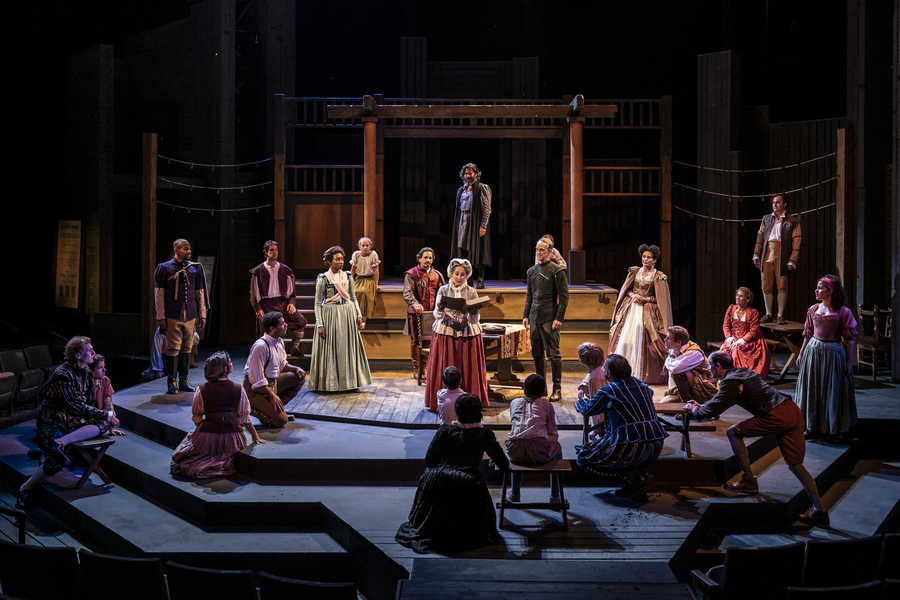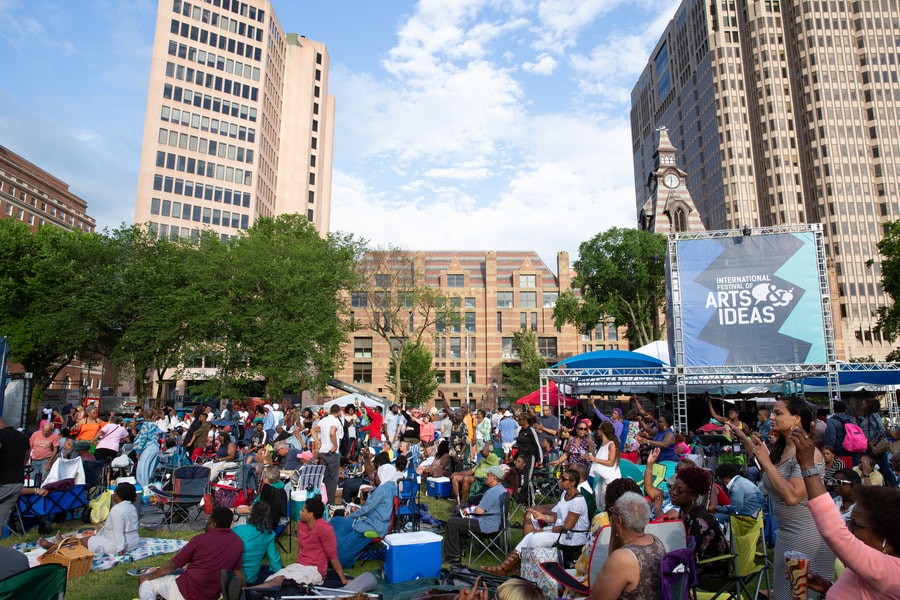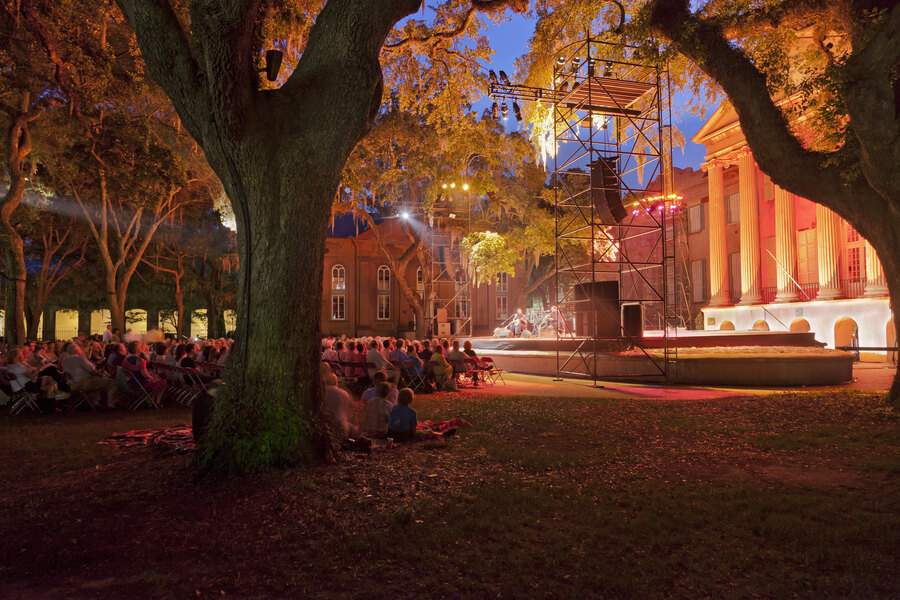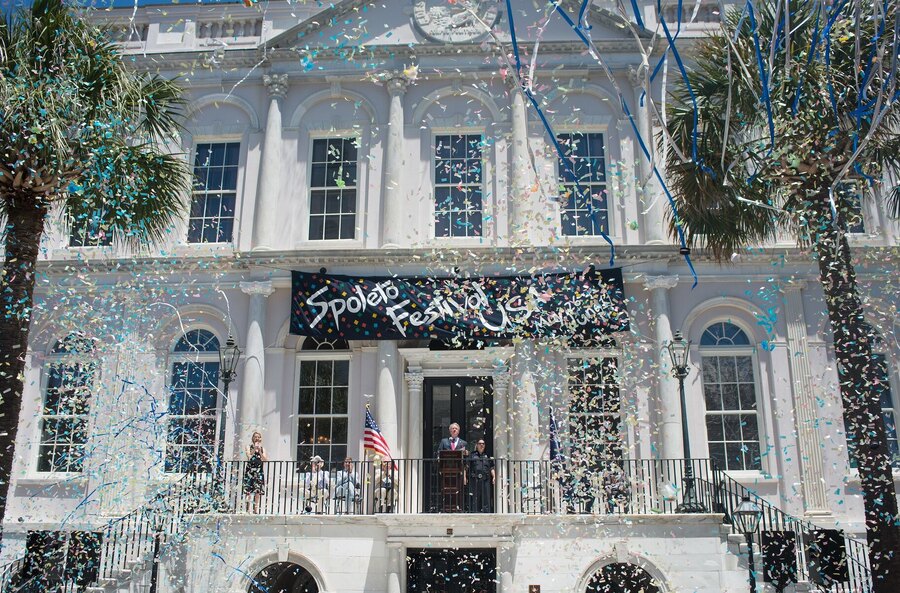Among the many shutdowns and changed plans required by the coronavirus pandemic, some of the most painful for theatre enthusiasts are the cancellations of summer arts festivals, whose plans for the warmer months have changed abruptly from strolling in the sun between performances to finding other travel and arts options, if any, closer to home. As the pandemic continues, these cancellations affect not only patrons but also artists, local businesses, and in some cases the festivals’ future viability.
Some have been able to reschedule: Contemporary American Theater Festival (CATF) in Shepherdstown, W. Va., has moved its four-week 2020 season to July 2021, postponing its 30th-anniversary repertory of six new American plays for another year. Other theatres, such as the Utah Shakespeare Festival, Williamstown Theatre Festival, and American Players Theatre (APT) have elected to suspend summer festival programming out of concerns for public health. Patrons across the country are parsing through their options to either donate the value of their tickets back to the respective theatres, receive a credit for next year, or receive a refund.
Many organizations are producing alternative virtual programming to continue to engage artists and patrons throughout the shutdowns. The International Festival of Arts & Ideas in New Haven, Conn., is rolling out an entirely virtual festival, which began at the end of April and continues through the end of June.
Arts & Ideas co-director Tom Griggs said the decision to move the festival online required reorienting sponsors and patrons to a virtual platform. Corporate sponsors have been flexible and fully supportive, he said, during the move to online programming, and from what he’s seen so far, patron attendance will last longer than the usual duration of the festival as they engage with the art on their own schedules. For Arts & Ideas, the physical and psychological shift needed to adjust the festival was well worth the effort.
“We’re a creative group of people,” Griggs said. “Let’s put our heads together and see how we can alter our performances. This summer will still have creativity.”
From GoPro biking tours to performances broadcast in assisted living homes to Zoom cooking classes with food kits from local restaurants replacing the food bazaars and tastings of past festivals, Arts & Ideas is finding alternate ways to bring people together. The fest even launched a concierge performance service called Arts on Call, modeled after Baltimore’s Creative Alliance Sidewalk Serenades program. Patrons can purchase a 15-minute performance by a New Haven-based artist to be rendered live in front of the patron’s residence. People can also send the performances as gifts to other members of their community.
“It’s a way that we can get these New Haven artists back to work and bring joy to people’s lives in a safe and socially distant way,” said Bobby Asher, director of programming at Arts & Ideas.

Arts & Ideas isn’t the only festival exploring virtual programming. The Alabama Shakespeare Festival in Montgomery commissioned 22 Southern playwrights—including Pearl Cleage, Will Arbery, and Lisa D’Amour—to create new pieces about what home means to them. The monologues are performed by 22 actors around the country as “a way to keep creative people creating,” said executive director Todd Schmidt. The 22 Homes series, accessible through the festival’s website, is accompanied by videos of stage actors reciting their favorite Shakespearean monologues.
Meanwhile Contemporary American Theater Festival, though not producing plays this year, is pulling back the curtain and inviting patrons into design meetings and discussions with playwrights of the postponed offerings. The behind-the-scenes series will launch on July 10, which would have been the festival’s opening day. Audience members will see design research like set sketches and costume renderings, followed by a 10-minute teaser scene from one of the plays now scheduled for 2021. The virtual programming will be a more in-depth view of the making of new theatre than audience members usually get during the in-person festival. The series, called CATFUNMUTED, will feature individual Q&A sessions with each playwright that wouldn’t have normally been offered during the festival. This programming also allows CATF to honor their contracts with the six playwrights who had been selected for the 2020 festival, among them Chisa Hutchinson and Caridad Svich.
The Spoleto Festival USA, in Charleston, S.C., an international performance gathering that encompasses music, dance, and theatre, has turned to local broadcasting avenues to share art with the community, replacing the in-person festival that had been scheduled to run from May 22 to June 7. Spoleto’s chamber music series plans to air recordings of past seasons’ work through NPR. Spoleto also plans to produce a Zoom workshop with Rhiannon Giddens and Michael Abels, the composers of the new opera Omar, which the festival had commissioned for the 2020 season.
These virtual alternatives give patrons an opportunity to engage in artistic content from wherever they are this summer, as well as a way to connect with the festivals and arts organizations they are so fond of. Nigel Redden, general director of Spoleto, said he has seen an outpouring of support from patrons, despite their disappointment in missing the festival, which had also scheduled plays by Emma Rice, Dael Orlandersmith, and Javaad Alipoor for 2020.
“We’ve received a lot of responses, and many of them were very touching,” Redden said, recalling patrons’ apologies when requesting refunds for their tickets. “They couldn’t give us the value of the tickets because they were out of a job or their children were without jobs. Yet a lot of people were very concerned about what was happening to the festival and what was happening to us.”
Redden mentioned one patron who referred to Spoleto as Christmas in Charleston. “It was quite moving,” he said.
Despite the significant financial hit Redden expects, he affirmed that Spoleto will survive. “Our business model is adaptability, and we absolutely believe in the importance of what we put onstage—that there is something remarkably important to the human spirit to have performances in the way that we do in the festival,” Redden said, citing the religious origins of festivals and the communal intensity that often marks them.
Like Redden, Carrie Van Hallgren, managing director of American Players Theatre in Spring Green, Wis., has also been inspired by the gratitude and enthusiasm from patrons. “They feel like Spring Green is a second home,” she said. “We are hearing from them, ‘We can’t wait! As soon as you open, we will be there.'”
APT plans to hold performances at the next available opportunity, whether that’s outdoors in September, indoors in December, or returning to normal programming next summer, said Van Hallgren. Employing local artists, including core company members who were rehired for eight weeks with funds from the Paycheck Protection Program, will allow APT to create the “Out of the Woods” play reading series, available on the PBS Wisconsin website from June 5 to July 10.
“It’s been amazing and inspiring to be in those virtual rooms with those artists who continue to make work,” Van Hallgren said. And while the coronavirus and its impact have been heartbreaking, the shutdowns have sparked a new camaraderie around the festival. “This is building a community and helping our audiences, our local businesses, and our actors to realize that this is truly a family.”
That summer festival family extends to Spring Green business owners, who depend on the 100,000 tourists who dine at local eateries and poke into community bookshops as a pillar of their yearly revenue.

The same goes for businesses in Shepherdstown. “It’s going to be very difficult,” said CATF founder and producing director Ed Herendeen. “The merchants here, and our partners, and their partners, work together to create a better quality of life for the community, which depends on the June and July income.”
A 2018 economic impact study, conducted with arts marketing firm Shugoll Research, showed that that year’s CATF season generated $5.86 million of economic activity for the local and state economies that year, an increase of 83 percent over the 2008 study results. That income, and its projected increase in 2020, makes quite a difference to a town of fewer than 2,000 people in West Virginia. The study also revealed that the money spent by the festival and its audience supports 87 full-time jobs.
Hopefully, those audience members will return to Shepherdstown in the summer of 2021 to continue their patronage of the artists and local community. In the meantime, Herendeen said, thanking them for their previous support is a top priority.
“We’re actually running a Thank-a-Thon with our board members,” he said. “The trustees are calling our donors who have contributed money and the people who have converted their ticket purchase to a donation and thanking them.”
The festivals are determined to return to programming in 2021, despite a year of lost revenue, but the economic effect of the pandemic could last beyond the shutdowns. Arts & Ideas’ Griggs predicts the festival will be impacted for at least two more seasons as Connecticut has seen a drop in the hospitality tax that supports the arts. Cities are projecting deficits, hospitals are bleeding money, and philanthropy is endangered by a crashing stock market. As businesses in all industries feel the financial strain of COVID-19, future funding for arts organizations hangs in the balance.
But this is not the end of art, nor the end of hope for summer theatre festivals.
“We know there are lean times ahead,” said Asher of Arts & Ideas. “As long as we stay focused on our job as artists, which is to bring joy and thought and ideas to people in an expressive way, we will come out stronger. It’s going to be a long time before we get close to normalcy again, but we will be stronger when we do.”
Said Van Hellgren, “This is an opportunity to reimagine how we operate and to reconsider how we are engaging with our artists and our audiences, for a renewed joy in live theatre and the ability to rediscover it when we are together again.”
Kate Mazade is a Goldring Arts Journalism graduate student at Syracuse University.




